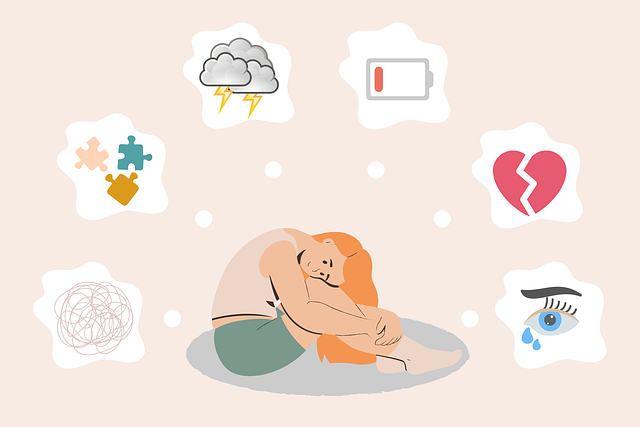Burnout among healthcare providers working with sexual abuse survivors in Lafayette is a pressing issue, driven by demanding workloads and emotional strain. Early recognition of burnout symptoms, such as depersonalization and cynicism, is key. Implementing self-care strategies like Mind Over Matter principles, positive thinking, and self-awareness exercises can mitigate risks. Creating supportive work environments with transparent communication, flexible schedules, peer support, and access to counseling services is essential for prevention. Enhancing self-care with regular exercise, balanced nutrition, and relaxation techniques reduces stress and improves resilience. Effective communication strategies and load management tailored to high-pressure settings like Lafayette Sexual Abuse Survivor Therapy centers further combat burnout, ensuring healthcare providers maintain well-being while delivering quality patient care.
Healthcare provider burnout is a growing concern, impacting not only individual well-being but also patient outcomes. This article explores comprehensive strategies to prevent burnout among healthcare professionals. We delve into understanding the signs and causes, emphasizing the importance of a supportive work environment and enhanced self-care practices. Effective communication techniques and load management are also discussed, offering practical insights for institutions and individuals alike, including valuable information relevant to Lafayette Sexual Abuse Survivor Therapy settings.
- Understanding Burnout: Recognizing the Signs and Causes in Healthcare Providers
- Creating a Supportive Work Environment: Strategies for Prevention
- Enhancing Self-Care Practices: Prioritizing Mental and Physical Well-being
- Implementing Effective Communication and Load Management Techniques
Understanding Burnout: Recognizing the Signs and Causes in Healthcare Providers

Burnout among healthcare providers is a growing concern, as the demanding nature of their work can lead to physical and emotional exhaustion. It’s essential to recognize the signs early on to prevent this from becoming a serious issue. Burnout often manifests as a sense of depersonalization, where providers feel detached from their work and patients. This may be accompanied by increased cynicism, leading to feelings of negativity and reduced professional satisfaction.
Several factors contribute to healthcare provider burnout, including heavy workloads, long working hours, and a lack of control over job-related decisions. The constant exposure to traumatic events, such as those experienced by survivors of sexual abuse seeking therapy in Lafayette, can also take a toll. Therefore, implementing strategies that promote self-care and resilience is vital. Adhering to Mind Over Matter principles, cultivating positive thinking, and engaging in self-awareness exercises can help healthcare providers maintain their well-being and prevent burnout.
Creating a Supportive Work Environment: Strategies for Prevention

In preventing healthcare provider burnout, creating a supportive work environment is paramount. This involves fostering a culture that prioritizes mental well-being and encourages open communication. Organizations can achieve this through regular staff meetings where concerns are addressed transparently, promoting flexible work schedules to balance professional and personal life, and implementing peer support systems to foster camaraderie and reduce feelings of isolation. Additionally, providing access to resources for stress management, such as counseling services or mindfulness programs, can significantly contribute to a healthier work environment.
Lafayette Sexual Abuse Survivor Therapy, while not directly related to the broader context, serves as a poignant reminder of the importance of specialized support within healthcare settings. Similar initiatives focused on mental health awareness and development can enhance overall well-being. Public Awareness Campaigns Development can play a crucial role in promoting these efforts by educating both providers and the public about burnout prevention, encouraging adoption of Mind Over Matter Principles to cultivate resilience against stress.
Enhancing Self-Care Practices: Prioritizing Mental and Physical Well-being

Enhancing self-care practices is a pivotal strategy in burnout prevention for healthcare providers. Prioritizing mental and physical well-being can significantly reduce stress levels and foster resilience. Healthcare professionals often face high-pressure situations, which can lead to emotional exhaustion if not adequately managed. Incorporating regular exercise, balanced nutrition, and sufficient sleep into daily routines is essential for maintaining optimal health. Additionally, engaging in activities that promote relaxation and stress reduction, such as meditation or yoga, can help healthcare providers recharge and maintain their well-being.
The integration of conflict resolution techniques further strengthens self-care efforts. Effective communication and problem-solving skills enable professionals to navigate challenging situations with resilience, minimizing the impact on their mental health. By adopting these practices, healthcare providers can create a healthier work environment, improve patient care, and ultimately prevent burnout, as evidenced by studies focusing on Lafayette Sexual Abuse Survivor Therapy, which highlights the importance of holistic healing and self-care in vulnerable populations.
Implementing Effective Communication and Load Management Techniques

Healthcare providers often face overwhelming workloads and complex patient interactions, which can lead to burnout if unaddressed. Implementing effective communication strategies is a powerful tool in preventing this. By fostering open dialogue with patients and colleagues, healthcare professionals can manage expectations, clarify responsibilities, and reduce misunderstandings. This, in turn, lessens the emotional burden and promotes a sense of control over one’s workload.
Load management techniques complement communication by helping providers prioritize tasks and delegate when necessary. Balancing patient care responsibilities with administrative duties is crucial for maintaining emotional well-being. Strategies such as scheduling flexibility, efficient documentation systems, and utilizing technology for remote consultations can alleviate stress and anxiety relief, especially in high-pressure settings like Lafayette Sexual Abuse Survivor Therapy centers. Conflict resolution techniques also play a significant role in managing workloads by promoting understanding among team members, ensuring everyone is on the same page regarding patient care goals and expectations.
Healthcare provider burnout is a pressing issue, but with proactive strategies, it can be mitigated. By fostering a supportive work environment, encouraging self-care practices, and implementing effective communication techniques, healthcare organizations can prevent burnout and enhance the well-being of their staff. Remember, investing in burnout prevention is not just beneficial for providers; it also improves patient care and organizational success. Just as Lafayette Sexual Abuse Survivor Therapy focuses on healing individuals, these strategies aim to restore and retain the passion and dedication of healthcare professionals.














